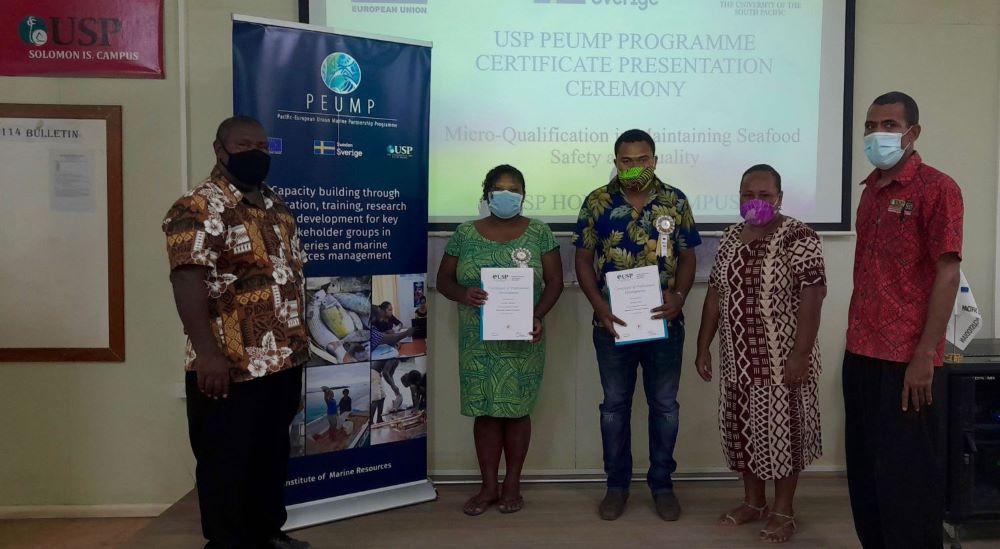Related News

Fifteen Solomon Islanders are now the first in their country to get awarded a Micro-Qualification in Maintaining Seafood Safety and Quality through scholarships funded through the University of the South Pacific (USP) Pacific-European Union Marine Partnership Programme (PEUMP).
Six women were part of this two-week face-face cohort held in the capital of Solomon Islands, Honiara delivered in collaboration with the USP- Pacific Technical and Further Education (TAFE).
Out of this 15, five awardees are also holders of the coveted Micro-Qualification in Establishing and Operating a Small Seafood Business through USP PEUMP scholarships.
In December 2020, 15 Fijians and one i-Kiribati woman were part of the first cohort of the Micro-Qualification in Maintaining Seafood Safety and Quality delivered in Suva, Fiji.
Former gender community worker, Alison Meiara, who has walked an hour to mangroves to glean seafood and then take a ride in an open punt with her mum, aunts and sisters from the age of ten to sell their catch at ports said these learnings’ will help her work in building on from the traditional knowledge currently used and empower women in the Isabel Province with new techniques.
“The interconnection of the changing climate and the global pandemic, COVID-19, is affecting the livelihoods of our women, as seafood is what we rely on to feed our families and our income. These skills can now be harmonised with traditional knowledge to ensure there is taste, freshness and quality on peoples’ tables and plates,” she said.
Fisheries Officer, Wilson Kiyo’s, role includes the inspection of seafood sold in the Solomon Islands domestic market, to establish and monitor whether raw or cooked is safe and nutritious for consumption.
“This micro-qualification is an added bonus to the skills I can use to inspect and share the knowledge with my peers, fisherfolk and seafood sellers to help them embrace and recognise the importance of proper seafood handling and maintaining quality,” he said.
USP, Acting Deputy Vice-Chancellor Education, Professor Jito Vanualailai, in congratulating the awardees said through the PEUMP Programme, USP, is making an effort to build capacity through education, training, research and development for key stakeholder groups in fisheries and marine resources management in the 15 Pacific ACP Group of countries (PACP).
“USP is a regional community and whilst staying true to our core values and ensuring that we remain Pacific Ocean Custodians and drivers of the future of our region, we are “Shaping Pacific Futures”. The delivery of such unique micro-qualifications extends our outreach to the very heart of our Pacific communities,” he said.
The standards of this micro-qualification focus on the fundamentals of maintaining the safety and quality of seafood. The awardees outlined causes of seafood spoilage and quality control factors; demonstrated basic post-harvest seafood handling skills; and applied inspection techniques and guidelines to maintain seafood quality.
This micro-qualification, like the previous cohorts of the Micro-qualification in Establishing and Operating a Small Seafood Business, is a subset or component of a qualification that is designed to address a specific need where only certain skill sets are required. Both micro-qualifications are accredited to the Pacific Register of Qualifications and Standards.
The USP is one of four key implementing partners of the overall PEUMP Programme, an initiative funded by the European Union and the Government of Sweden. The overall EUR 45million Programme promotes sustainable management and sound ocean governance for food security and economic growth, while addressing climate change resilience and conservation of marine biodiversity. It follows a comprehensive approach, integrating issues related ocean fisheries, coastal fisheries, community development, marine conservation and capacity building under one single regional action.